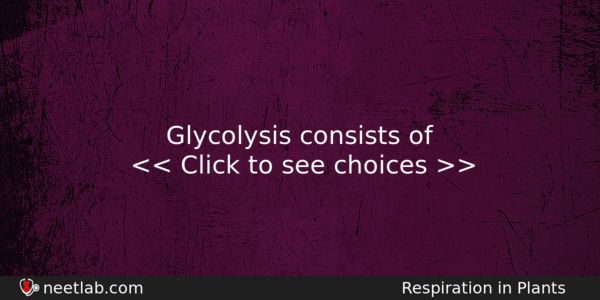| ⇦ | 
| ⇨ |
Glycolysis consists of
Options
(a) ten enzymatic reactions that convert a six-carbon molecule to four-carbon pyruvate and result in a net gain of 4 ATP molecules
(b) eight enzymatic reactions that convert a six-carbon molecule to four-carbon pyruvate and result in a net gain of 4 ATP molecules
(c) ten enzymatic reactions that convert a six-carbon molecules to three-carbon pyruvate and result in a net gain of 4 ATP molecules
(d) eight enzymatic reactions that convert a six-carbon molecules to three-carbon pyruvate and result in a net gain of 2 ATP molecules
Correct Answer:
eight enzymatic reactions that convert a six-carbon molecules to three-carbon pyruvate and result in a net gain of 2 ATP molecules
Explanation:
No explanation available. Be the first to write the explanation for this question by commenting below.
Related Questions: - The chromosomes in which centromere is situated close to one end are:
- Anti-viral substance is
- Which type of white blood cells are concerned with the release of histamine
- Heterozygosity is most favoured in plants following
- In an uqright pyramid of biomass, the herbivores occupy the position
Topics: Respiration in Plants
(184)
Subject: Biology
(4253)
Important MCQs Based on Medical Entrance Examinations To Improve Your NEET Score
- The chromosomes in which centromere is situated close to one end are:
- Anti-viral substance is
- Which type of white blood cells are concerned with the release of histamine
- Heterozygosity is most favoured in plants following
- In an uqright pyramid of biomass, the herbivores occupy the position
Topics: Respiration in Plants (184)
Subject: Biology (4253)
Important MCQs Based on Medical Entrance Examinations To Improve Your NEET Score
18000+ students are using NEETLab to improve their score. What about you?
Solve Previous Year MCQs, Mock Tests, Topicwise Practice Tests, Identify Weak Topics, Formula Flash cards and much more is available in NEETLab Android App to improve your NEET score.
Share this page with your friends

Leave a Reply